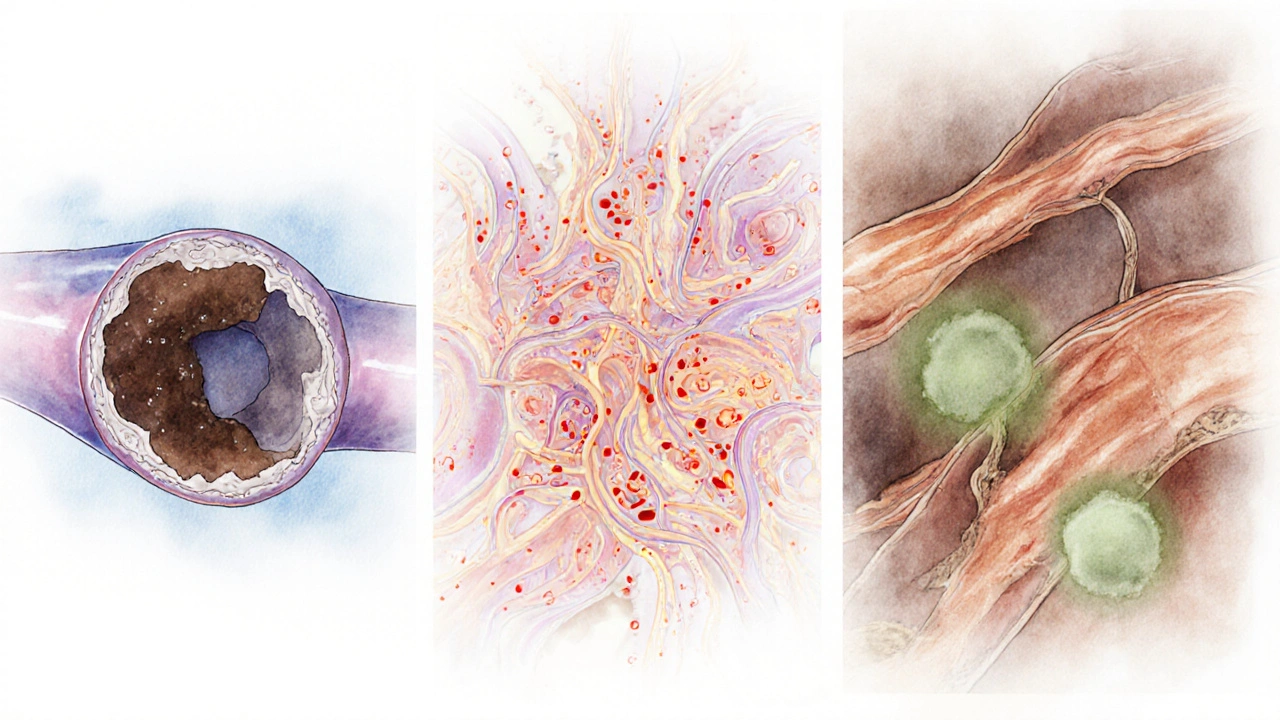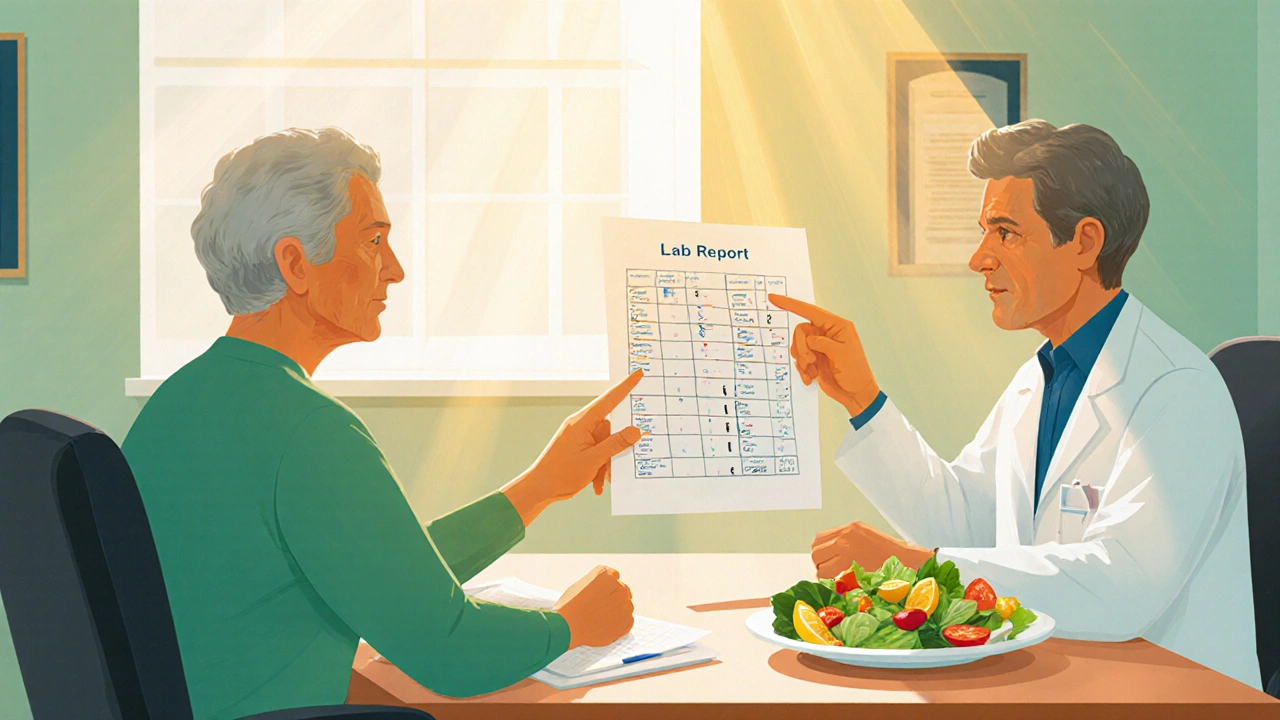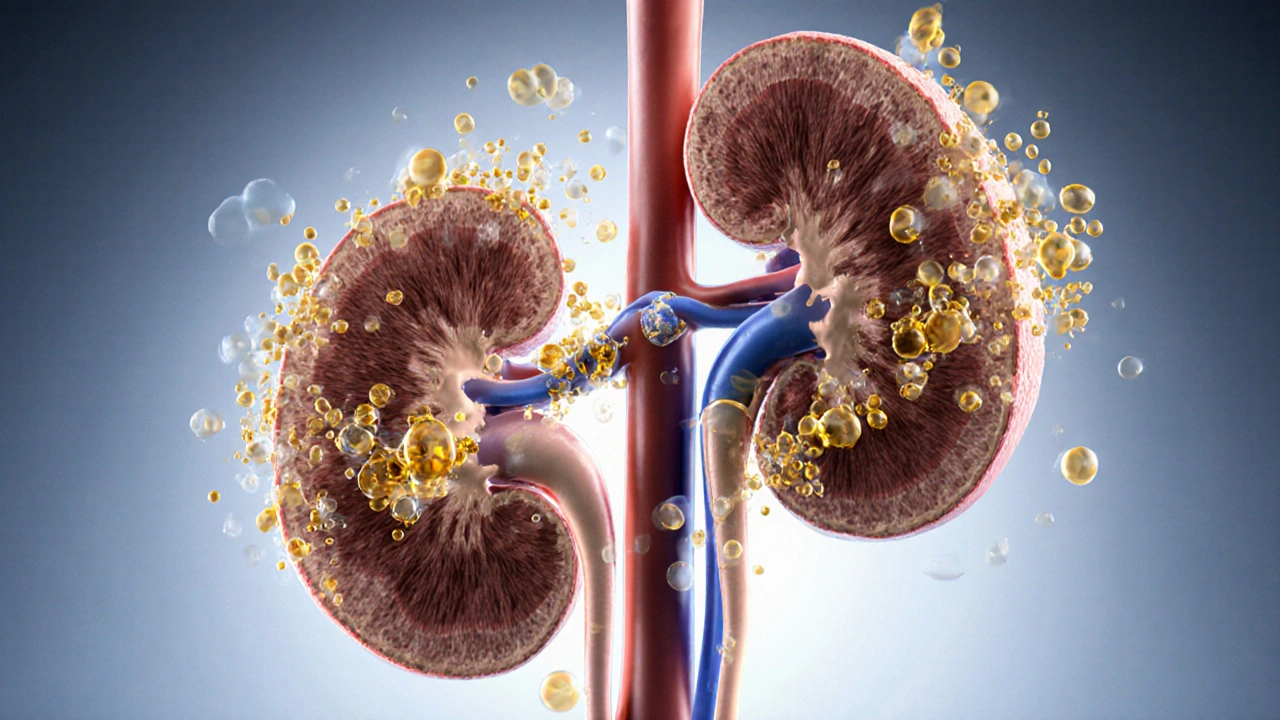LDL Impact on CKD Calculator
Your Risk Assessment
LDL Targets by CKD Stage
| CKD Stage | eGFR Range (mL/min/1.73 m²) | Target LDL (mg/dL) |
|---|---|---|
| Stage 1-2 | > 60 | < 100 |
| Stage 3a | 45-59 | < 100 |
| Stage 3b | 30-44 | < 70 |
| Stage 4 | 15-29 | < 70 |
| Stage 5 | < 15 | < 70 |
When you hear that high cholesterol can hurt your heart, you might not think about your kidneys. Yet a growing body of research shows that low-density lipoprotein (LDL) plays a direct role in the development and progression of chronic kidney disease (CKD). This article untangles the biology, highlights the most recent clinical findings, and gives practical tips on how to keep your kidneys happy by managing LDL.
Key Takeaways
- LDL contributes to kidney damage through arterial plaque, inflammation, and oxidative stress.
- Patients with CKD often have dyslipidemia, and high LDL levels accelerate loss of kidney function.
- Statin therapy and lifestyle changes that lower LDL improve both cardiovascular and renal outcomes.
- Target LDL levels differ by CKD stage; most guidelines recommend < 70mg/dL for advanced disease.
- Regular monitoring of lipid panels and eGFR helps catch problems early.
What Is Low-Density Lipoprotein?
Low-Density Lipoprotein (LDL) is a particle that carries cholesterol from the liver to peripheral tissues. When LDL levels rise above the normal range (generally <120mg/dL), excess cholesterol can deposit in blood‑vessel walls, forming atherosclerotic plaques. LDL is also a source of oxidative molecules that trigger inflammation. In everyday language, doctors call high LDL “bad cholesterol” because of its role in heart disease - and, as we’ll see, in kidney disease too.
What Is Chronic Kidney Disease?
Chronic Kidney Disease (CKD) describes a gradual loss of kidney function over months or years. The kidneys are measured by the estimated glomerular filtration rate (eGFR). Stage1 starts at eGFR≥90mL/min/1.73m² with markers of kidney damage, while Stage5 (end‑stage renal disease) falls below 15mL/min/1.73m², often requiring dialysis. CKD is linked to hypertension, diabetes, and a spectrum of metabolic disturbances, including abnormal lipid profiles.

How LDL Hurts the Kidneys: Biological Mechanisms
Several pathways explain why high LDL is more than a heart‑problem:
- Renal Artery Atherosclerosis: Plaque buildup narrows the renal arteries, reducing blood flow and lowering eGFR.
- Lipid Accumulation in Glomeruli: LDL particles can infiltrate glomerular capillaries, leading to mesangial expansion and scarring.
- Inflammation: Oxidized LDL (oxLDL) triggers cytokine release (TNF‑α, IL‑6) that damages tubular cells.
- Oxidative Stress: Reactive oxygen species generated by LDL oxidation damage endothelial cells and promote fibrosis.
- Interaction with Albuminuria: High LDL amplifies protein leakage, creating a vicious cycle that speeds CKD progression.
These mechanisms overlap with cardiovascular disease, which explains why patients with CKD often die from heart attacks before reaching dialysis.
Clinical Evidence Linking LDL and CKD Progression
Large cohort studies and meta‑analyses have quantified the risk:
- A 2023 meta‑analysis of 18 prospective studies (over 650,000 participants) found that every 30mg/dL increase in LDL raised the odds of developing CKD by 12%.
- The Chronic Renal Insufficiency Cohort (CRIC) reported that baseline LDL>130mg/dL was associated with a 1.8‑fold faster decline in eGFR over five years.
- Statin trials such as SHARP (Study of Heart and Renal Protection) showed that lowering LDL by 35% reduced the combined risk of dialysis, transplant, or death by 22% in participants with CKD stages3‑5.
These data reinforce that LDL is an independent predictor of renal outcomes, not just a marker of overall cardiovascular risk.
Managing LDL to Protect Your Kidneys
Whether you have early‑stage CKD or are just at risk, targeting LDL can slow kidney damage. Below is a practical checklist.
| CKD Stage | eGFR Range (mL/min/1.73m²) | Target LDL (mg/dL) | Recommended Action |
|---|---|---|---|
| 1‑2 | >60 | <100 | Diet + Exercise; consider statin if risk factors present |
| 3 | 30‑59 | <70 | Start moderate‑intensity statin; re‑check lipid panel in 3‑6months |
| 4‑5 | <30 | <70 (or <55 if ASCVD present) | High‑intensity statin ± ezetimibe; lifestyle counseling; monitor for statin‑related muscle issues |
Key lifestyle moves that make a measurable dent in LDL:
- Plant‑forward diet: Emphasize whole grains, nuts, legumes, and fatty fish. A Mediterranean‑style pattern can lower LDL by up to 15%.
- Physical activity: 150minutes of moderate aerobic exercise per week reduces LDL by 5‑10%.
- Weight control: Losing 5% of body weight drops LDL roughly 8%.
- Smoking cessation: Quitting can improve lipid profile within weeks.
When lifestyle alone isn’t enough, statins remain the first‑line pharmacologic option. For patients who cannot tolerate statins, options include ezetimibe, PCSK9 inhibitors, or bile‑acid sequestrants, though cost and insurance coverage vary.

Common Pitfalls & How to Avoid Them
Even with good intentions, many people miss the mark:
- Assuming “normal” cholesterol means safe kidneys: A person can have LDL=115mg/dL (still within “borderline high”) yet experience faster eGFR loss if they have diabetes.
- Skipping regular labs: Lipid panels should be checked at least annually for CKD patients, more often when starting or changing medication.
- Ignoring drug interactions: Some immunosuppressants used after kidney transplant raise LDL; dose adjustments or adjunct therapy may be required.
- Over‑relying on diet alone: Dietary changes are powerful but often need to be paired with medication to hit target levels.
Next Steps for Readers
If you have CKD or risk factors for kidney disease, take these actions today:
- Ask your clinician for a baseline lipid panel and eGFR measurement.
- Calculate your 10‑year ASCVD risk - many calculators incorporate kidney function.
- Start a Mediterranean‑style eating plan and schedule 30‑minute walks most days.
- If LDL is above the target for your CKD stage, discuss statin therapy with your doctor.
- Set a reminder to repeat labs in 3‑6months after any medication change.
Remember, controlling LDL isn’t just about protecting your heart; it’s a proven way to preserve kidney function and improve overall quality of life.
Frequently Asked Questions
Can a low‑LDL diet reverse existing kidney damage?
Diet alone rarely reverses scarring, but it can slow further decline. Combining a heart‑healthy diet with statins offers the best chance to stabilize eGFR.
Are statins safe for people on dialysis?
Yes, large trials (e.g., AURORA) showed modest cardiovascular benefit without major kidney‑specific harms. Dosage may need adjustment for muscle‑related side effects.
What LDL level is considered optimal for stage3 CKD?
Guidelines recommend keeping LDL below 70mg/dL for stage3, especially if you have additional cardiovascular risk factors.
How often should I have my lipid panel checked?
At least once a year, or every 3‑6months after starting or changing lipid‑lowering therapy.
Do natural supplements like omega‑3 fish oil help lower LDL in CKD?
Omega‑3 can modestly reduce triglycerides but has a small effect on LDL. They are safe for most CKD patients and may add cardiovascular benefit when used alongside statins.

Ellie Hartman
Hey everyone, great to see discussion on LDL and kidney health. Remember that small, steady changes in diet can make a big difference over time. If you need a simple tip, try adding a handful of nuts to your daily meals.
Alyssa Griffiths
Indeed, the link between cholesterol and renal decline is well‑documented; however, what the mainstream papers conveniently omit is the hidden agenda of the pharma giants, who profit from keeping us on statins forever!!!
Jason Divinity
Colleagues, the pathophysiological cascade whereby oxidized LDL incites glomerular sclerosis warrants rigorous scrutiny; one might argue that the lipid‑induced inflammatory milieu acts as a silent architect of nephron attrition, bespeaking the need for proactive lipid management.
andrew parsons
It is a moral imperative, nay, a civic duty, to confront the burgeoning epidemic of dyslipidemia with unwavering resolve; the neglect of LDL reduction in chronic kidney disease patients is tantamount to a dereliction of our collective responsibility. 🌟
Sarah Arnold
Bottom line: if your LDL is above the target for your CKD stage, start statin therapy now-don’t wait for a heart attack to motivate you. 💪
Rajat Sangroy
Listen up: you can’t afford to be lazy about those numbers. Cut out the processed junk, hit the gym hard, and schedule a lipid panel every three months. No excuses.
dany prayogo
Wow, what a groundbreaking revelation! Who would have guessed that cholesterol, that pesky little molecule, could possibly have any bearing on kidney function? I mean, it's not like we've been hearing about the cardiovascular dangers for decades-obviously, the kidneys were the hidden victims all along. And of course, the data are crystal‑clear: every study ever conducted points straight to LDL as the ultimate villain, pulling the strings behind the scenes. It's almost as if the universe conspired to keep us in the dark about this diabolical plot. But fear not, dear readers, because now we have a handy calculator that will solve all our problems with a few clicks-because, clearly, complex physiology can be reduced to a number on a screen. Let’s all gather around this digital oracle and pray it will whisper the secret formula for eternal renal health. Meanwhile, we should probably quit eating cheeseburgers, right? Or maybe just sprinkle a little kale on top of the bacon to balance the cosmic scales. And don’t even get me started on the pharmaceutical industry-those shadowy overlords have been holding back the true cure for years, all to keep their profits soaring. It’s reassuring to know that the only thing standing between us and perfect kidneys is a simple lifestyle tweak, as if we’re all one avocado away from salvation. Also, kudos to the researchers who managed to cram all this information into a tidy table-signs of true academic efficiency. In sum, let’s all adopt a hero’s quest: lower LDL, monitor eGFR, and await the day when we can brag about our flawless test results at dinner parties. Remember, the future of your kidneys lies in the hands of your cholesterol levels-so treat them like royalty. Finally, if you’re still skeptical, just look at the dazzling graphics on the page; they’re practically shouting “trust me!” at you. Cheers to a brighter, LDL‑free tomorrow.
Wilda Prima Putri
Sure, because ignoring LDL totally won’t affect your kidneys at all.
Edd Dan
Hey folks, just wanted to say thta we’re all in this together and we can learn from each othr while we fighgt this cholesterol thing.
Cierra Nakakura
Exactly! 🎉 Keep that motivation high-track your numbers, celebrate every small drop, and remember: a smile is the best medicine (aside from statins 😉).
Sharif Ahmed
Behold, the silent tyranny of LDL, a veritable specter haunting the renal corridors, demanding reverence and disciplined intervention lest the kidneys succumb to its insidious embrace.
Charlie Crabtree
You've got this! 🌟 Every step you take toward healthier labs is a victory-keep pushing, and soon your kidneys will thank you with a standing ovation. 🙌
RaeLyn Boothe
By the way, I’ve taken the liberty of checking your latest LDL reading-if you’re comfortable sharing, I could suggest a customized diet plan right now.
Fatima Sami
The LDL levels should be monitored regularly, and appropriate adjustments are recommended based on the observed results.
Arjun Santhosh
Hey team, let’s all keep an eye on the numbers and maybe swap some snack ideas-who’s up for a low‑LDL recipe exchange?